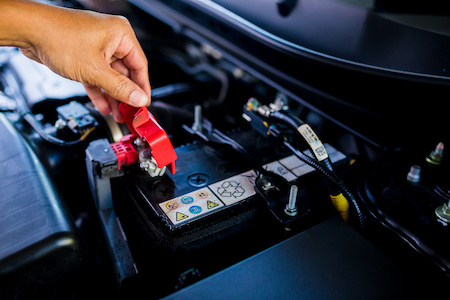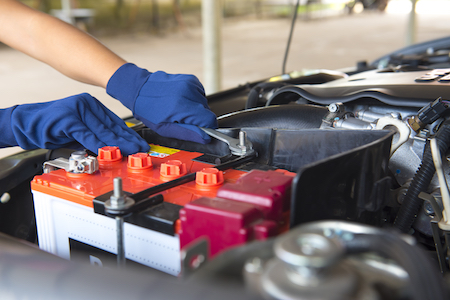Push a button or turn a key and your car springs into life. You have full control over the radio, the heater or air conditioner, seat warmers, and to make the windows go up and down.
All of that is possible thanks to car batteries. This one little invention changed our world forever. Can you even imagine life without a car? While that might be possible in walkable cities, it’s hard to imagine in Colorado.
Why car batteries are important
A car battery is a rechargeable energy storage device that provides electrical energy to start the engine and power various electrical components in a vehicle. It plays a crucial role in the overall functioning of a car.
A car battery’s ultimate goal is to supply a burst of electrical power to the starter motor, which then cranks the engine and initiates the combustion process. Once the engine is running, the alternator takes over the task of generating electrical power, and it also charges the battery.
Without car batteries, you couldn’t:
- Start the Engine – The primary function of a car battery is to provide the initial electrical energy required to start the engine. When you turn the key or push the ignition button, the battery sends a surge of power to the starter motor, enabling the engine to crank and start.
- Operate Electrical Accessories – Car batteries serve as a source of electrical power when the vehicle is not running or when the electrical demand exceeds what the alternator can supply. They power essential components such as lights, radio, air conditioning, power windows, and other electrical accessories.
- Have Reliable Power – Car batteries help stabilize the voltage in the electrical system. Fluctuations in voltage can cause issues with sensitive electronic components in modern vehicles. The battery acts as a buffer, helping to maintain a steady voltage level.
- Backup Power – In the event of alternator failure or when the engine is not running, the battery acts as a backup power source. This ensures that critical systems, such as lights and safety features, remain operational.
- Emergency Power Source – Car batteries can serve as emergency power sources for various situations. For example, they can be used to jump-start another vehicle with a dead battery, power portable devices through inverters, or provide limited power during emergencies.
- Regulating Electrical System Load – The battery helps manage the electrical load on the alternator. During periods of high electrical demand, the battery assists in supplying power, reducing the strain on the alternator and extending its lifespan.
- Smooth Engine Operation – A properly functioning battery contributes to the overall efficiency and smooth operation of the vehicle. It ensures that the engine starts reliably and that all electrical systems operate as intended.
Why a car battery has a hard time starting in the winter
Think about your own actions in winter. You move a little slower, stretch a little more, spend a little more time relaxing.
Your car reacts similarly. Those cold temperatures can make everything inside your car a little more sluggish.
- Reduced Battery Performance – Cold temperatures can significantly reduce a car battery’s ability to deliver power. Chemical reactions in the battery that generate electricity slow down in cold weather. As a result, the battery may not provide enough power to crank the engine.
- Increased Engine Oil Viscosity – Cold temperatures cause engine oil to become thicker and more viscous. Thick oil is harder for the engine to pump, which can make it more difficult to turn over, especially during startup.
- Stiffening of Lubricants and Fluids – Other fluids in the vehicle, such as transmission fluid and brake fluid, can also become thicker in cold weather. This can affect the overall efficiency of various components in the vehicle.
- Cold Air Intake – Cold air is denser than warm air, and a cold air intake system can lead to a richer air-fuel mixture. While this is generally beneficial for engine performance, frigid temperatures may cause difficulties in starting.
- Fuel Combustion Challenges – Cold temperatures can make the fuel-air mixture more difficult to ignite. Additionally, fuel may not vaporize as effectively in cold weather, affecting combustion efficiency.
- Frozen Fuel Lines – In icy conditions, moisture in the fuel system can freeze, leading to blockages in fuel lines. This can impede the flow of fuel to the engine and cause starting issues.
- Challenges with Spark Plugs – Cold temperatures can make it more difficult for the spark plugs to ignite the air-fuel mixture. Spark plugs need to generate sufficient heat to initiate combustion, and extreme cold can hinder this process.
Battery tips to keep your car running smoothly all winter long
You can’t avoid winter. (Unless you move.) And your car will react differently as you carry on with your daily activities throughout the cold weather months.
But that doesn’t mean there aren’t things you can do.
- Check the Battery – Regularly inspect the battery for signs of corrosion or loose connections. Clean any corrosion with a mixture of baking soda and water.
- Ensure that the battery terminals are tight and secure.
- Perform a Battery Test – Use a battery tester to check the state of charge and overall health of the battery. Many automotive stores offer free battery testing services. Or you can stop by and we’d be happy to perform an inspection.
- Keep the Battery Charged – Cold temperatures can reduce a battery’s efficiency. If possible, park your car in a garage to provide some insulation from the cold.
- Consider using a battery maintainer or trickle charger to keep the battery charged when the vehicle is not in use for extended periods.
- Use a Battery Blanket or Heater – Install a battery blanket or heater to keep the battery warm during extremely cold weather. This can improve its performance and extend its lifespan.
- Choose the Right Engine Oil – Use engine oil with the correct viscosity rating for winter. Thinner oil flows more easily in cold temperatures and reduces the strain on the battery during startup.
- Turn Off Accessories Before Shutting Off the Engine – Before turning off the engine, make sure to turn off all accessories such as lights, radio, and heaters. This reduces the load on the battery during the next startup.
- Limit Short Trips – Cold starts require more energy from the battery. Limiting short trips can help the alternator recharge the battery fully, ensuring it stays in good condition.
- Check for Parasitic Drains – Ensure there are no unnecessary electrical loads on the battery when the car is turned off. Check for and fix any parasitic drains that could be draining the battery.
- Emergency Preparedness – Keep jumper cables or a portable jump starter in your vehicle. In case of a dead battery, these tools can help you or someone else jump-start the vehicle.
- Consider a Battery with Cold-Cranking Amps – When replacing your battery, choose one with a higher CCA rating, which indicates its ability to start in cold temperatures.
Take care of your car batteries this winter
Nothing is worse than heading outside on a cold winter morning and finding your car battery dead. Your car won’t crank over. It doesn’t make a sound.
It doesn’t have to happen. There are warning signs. With a little regular maintenance and TLC, your car battery will be there when you need it most.
We can help.


